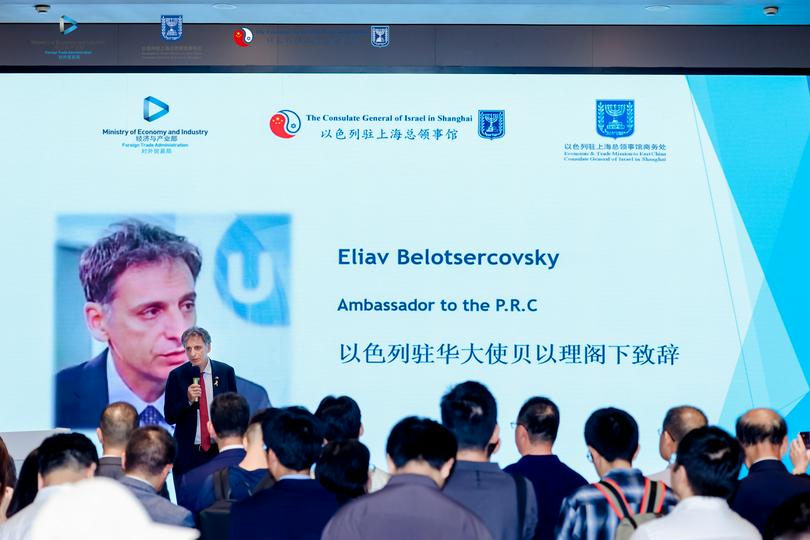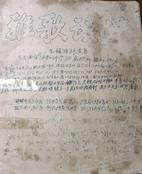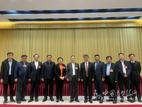On the afternoon of September 18, 2025, a welcome ceremony for the newly appointed Israeli Ambassador to China and a celebration of the Jewish New Year were held in Shanghai.
Eliav Belotsercovsky, who officially took office in June, holds a bachelor's degree in International Relations and Far Eastern Affairs with a focus on China from the Hebrew University of Jerusalem and a master's degree in International Management from Boston University. With more than 30 years of service at the Israeli Ministry of Foreign Affairs, he has held a wide range of positions, including Israel's Ambassador to South Africa and to Ukraine, non-resident Ambassador to Moldova and Armenia, Director of Economic Relations with India and China, and Deputy Chief of Mission at the Israeli embassies in India, Cyprus, and Singapore.
At the welcome reception, Eliav Belotsercovsky recalled his visit to Shanghai 13 years ago, noting that he was very impressed by the city's tremendous progress and achievements since then. He stated that his mission as ambassador is to strengthen cooperation between China and Israel across all sectors. While based in Beijing, he stressed his interest in fostering collaboration not only in Shanghai but also in other provinces.
In his remarks, the ambassador highlighted that innovation cooperation between China and Israel is mutually complementary, bringing benefits to both peoples and contributing to the advancement of human civilization. He affirmed Israel's commitment to promoting open and inclusive international cooperation in science and technology, with the aim of making innovation a bridge to peace and prosperity.
Ambassador Belotsercovsky identified three key areas where he hopes to deepen bilateral cooperation. The first is agriculture, a long-standing strength of Israel, where greater collaboration in research and development with China is envisioned. The second is healthcare, an area in which Israel has made significant advances, while China faces the challenges of an aging population. The third is education, particularly in the cultivation of gifted students. Israel, he noted, places strong emphasis on providing targeted and intensive education to enable talented youth to realize their potential and make greater contributions to society.
Ben Haimi, Economic Consul and Head of the Economic and Trade Mission to South and East China at the Consulate General of Israel in Shanghai, also addressed the event. He noted that the synergy between Israel's innovation and China's market has already yielded remarkable achievements across multiple sectors, fostering both economic growth and improvements in daily life. He expressed confidence that there remains considerable potential for further cooperation, pledging continued efforts to explore new avenues of partnership to create win-win outcomes. He also extended his wishes for the upcoming Jewish New Year, expressing hope for expanded opportunities and progress in economic and business ties between the two countries.
At the reception, Ms. Ravit Baer, Consul General of Israel in Shanghai, introduced guests to the traditions of the Jewish New Year. She explained that, like the Chinese New Year based on the lunar calendar, the Jewish New Year is observed according to the Jewish calendar, typically in early or late September. This year, it falls on September 22. The holiday is marked by festive meals rich with symbolic foods. For instance, pomegranates represent vitality, opportunity, and abundance; fish heads symbolize the aspiration for leadership and not falling behind; and apples dipped in honey convey wishes for a sweet and joyful new year.
Ambassador Eliav Belotsercovsky spent two days in Shanghai on September 17 and 18. In addition to attending the welcome reception at the China-Israel Innovation Hub on the 18th, he visited the Modern Art Museum Shanghai and the Shanghai Jewish Refugees Museum on the 17th. According to the Israeli Embassy in China, while walking through the historical galleries of the Refugees Museum, the ambassador reflected on Shanghai's profound friendship extended to Jewish refugees during World War II. The story of the "Shanghai Ark," transcending time and space, continues to stand as a testament to the shared trials and hopes of both peoples.
Originally published by the Christian Times
- Edited and translated by Poppy Chan












